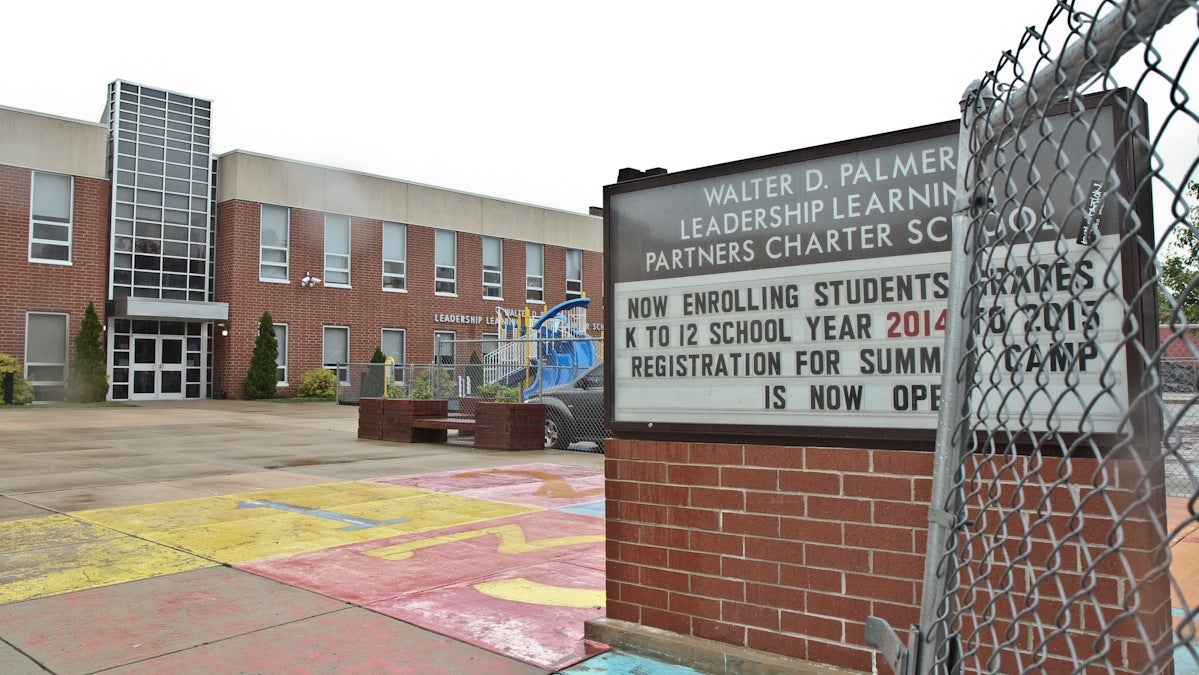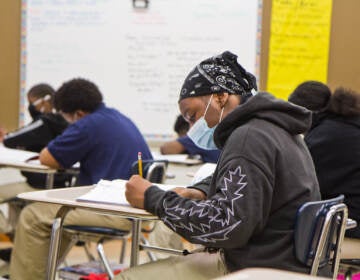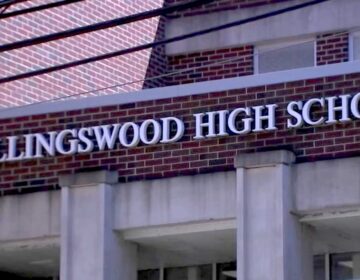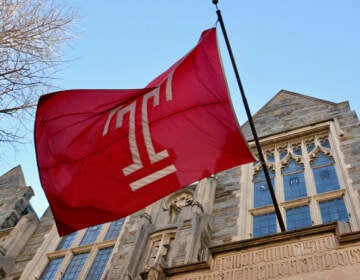Philly charter head calls state Supreme Court decision against his school ‘political’

Walter D. Palmer Leadership Learning Partners Charter School. (Kimberly Paynter/WHYY)
The Pennsylvania Supreme Court ruled Tuesday in favor of the School Reform Commission in a case involving student enrollment caps at a Philadelphia charter school.
In a unanimous decision overturning a lower court ruling, the state’s high court said that the Philadelphia School District and the SRC were within their legal rights to cap enrollment at Walter D. Palmer Leadership Learning Partners Charter School based on a mutually signed agreement.
In 2005, Palmer agreed to abide by a cap of 675 students, but a Commonwealth Court later ruled Palmer should be paid $1.3 million from the district for students in excess of the cap. In its 2005 charter-renewal application, the Palmer school asked to increase ts cap. The SRC denied its request, citing poor academic performance on state standardized tests.
Palmer argued that, although it had signed a five-year charter in 2005, the SRC had unilaterally imposed the cap.
The Pennsylvania Supreme Court rejected that argument. “The SRC and the charter school then entered into, as of September 1, 2005, a legally binding agreement,” wrote Justice Seamus McCaffery in the opinion.
School founder Walter Palmer characterized the outcome as a “patently wrong” decision based more on the politics than legality.
“One of the things I always said and shared with people is, if in fact the Pennsylvania Supreme Court would make a decision based on the law … we’d prevail,” he said. “If they made a decision based on politics, we would not.”
Palmer said he had no specific information to back up his allegations, but broadly characterized Philadelphia as a “political” and “incestuous” city.
Palmer’s K-12 school currently serves almost 1,300 students on campuses in Northern Liberties and Frankford.
For the 2007-2008 school year, Palmer’s average daily enrollment was approximately 729 students. For the 2008-2009 and 2009-2010 school years, the average daily enrollment was approximately 732 and 765 students, respectively.
In these years, the district paid the charter for only 675 students. Palmer appealed to the state Department of Education in 2010.
Based on the 2008 state law that bars districts from unilaterally capping charter enrollment, the department agreed that Palmer was underpaid for the 2008-2009 and 2009-2010 school years.
The department then diverted $1.3 million from the district’s share of state funds directly to the school.
The school district appealed the decision in 2012, but the Commonwealth Court affirmed the Department of Education’s rationale.
In Tuesday’s opinion, the Supreme Court said the Commonwealth Court and the department “imposed a requirement that has no basis in the statute.”
Nothing in the language of the law supports the view, the court said, that agreed-to-caps become invalid based on the 2008 changes to the charter law.
The court said the terms of Palmer’s charter make it “unmistakably clear” that the district was within its rights to withhold payment for students enrolled beyond the cap.
“The charter school’s arguments to the contrary lack merit,” the decision read. “The charter school’s contention that the enrollment cap was somehow unilaterally imposed without its consent, acquiescence, or agreement is belied by the straightforward text of the 2005 charter, a ‘legally binding agreement’ signed by the charter school.”
Repo man
Michael Davis, general counsel for the school district, praised the decision, saying the next step is for the district to retrieve the $1.3 million the department of education diverted to Palmer.
“By reversing the Commonwealth Court and the secretary, the Supreme Court determined that the district is entitled to have that money back,” said Davis. “It never should have been withheld.”
The district can choose to attempt retrieval by appealing to the Commonwealth Court or to the state Department of Education. Davis said it hasn’t yet decided which option to pursue.
Asked if he interpreted the decision to mean that the charter would have to repay the $1.3 million, Walter Palmer said: “We have not heard that.”
“I’m here to tell you that he does,” said Davis. “The charter school does have to pay that money back. We will be seeking to have that money returned to the school district which … is in extremely dire financial straits. We need every dollar we can get in this door.”
Robert Fayfich, executive director of the Pennsylvania Coalition of Public Charter Schools, said his group was “disappointed” by the court’s decision.
In an amicus brief filed before the court made its decision, the Education Law Center lobbied for the court to rule in the district’s favor.
“If the Pennsylvania Department of Education and the courts of this Commonwealth are unable to enforce reasonable controls on the growth of charter schools through legally negotiated and agreed-upon enrollment caps, it spells doom for school districts and the additional services they provide to their communities,” the ELC brief read. “It will also erode access to a quality public education for vulnerable student populations.”
In a telephone interview Wednesday, ELC staff attorney David Lapp lauded the court’s opinion as a “major victory for the district.”
“Any other charter schools that are out there that have caps in their charters,” said Lapp, “if they try and violate and go over those caps … they’re not going to get paid for those students.”
According to the district’s charter office there are 18 charter schools with signed charters that are currently enrolling between one and 25 students over their agreed-to-caps. But, the district said, the distinction here is that these schools have not appealed to the state for a share of funds larger than their capped allotment.
The only charter that is currently appealing to the state for funds for students over its agreed-to-cap is Harambee Charter.
There are currently 16 charters operating without signed agreements. Some of these have been renewed by the SRC, some not.
Looming question
But beyond the purview of this court decision, a larger question looms. Does the School Reform Commission have the “special powers” to suspend the part of the charter law that mandates that caps can’t be unilaterally imposed?
The district has said “yes.” The charter community has said “no.”
The court didn’t rule on this question in the Palmer charter case. That question will likely be answered in the district’s case against West Philadelphia Achievement Charter Elementary School, another involving enrollment caps.
“I don’t think there’s anything in this decision that addresses one way or the other, either for the district or against the district, as to whether or not they’re able to suspend provisions of the school code,” said Lapp. “It just wasn’t an issue before the court.”
Based on Palmer charter’s low academic performance on state standardized tests as well as its alleged misuse of district funds, the School Reform Commission voted in April to begin the process of revoking the school’s charter.
The revocation process for Palmer charter will begin with a hearing Monday.
Walter Palmer plans to open school next fall as scheduled. Student population, he said, “will stay the same.”
WHYY is your source for fact-based, in-depth journalism and information. As a nonprofit organization, we rely on financial support from readers like you. Please give today.





